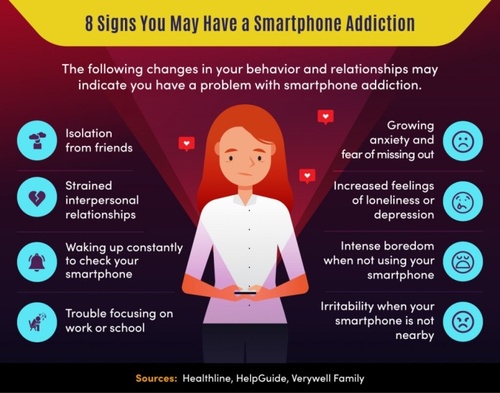

The majority of those who scored high on the fear of missing out tend to overuse their phones. Similarly, these individuals score high on anxiety and depression scales. That is because excessive use of smartphones interferes with social activities and therefore increases depression.
Excessive smartphone use can disrupt your sleep, which can have a serious impact on your overall mental health. It can impact your memory, affect your ability to think clearly, and reduce your cognitive and learning skills.
Smartphone Addiction: How Technology Affects Public Health and Social Relationships
Smartphones and other digital devices have helped individuals keep in touch with their loved ones, stay informed and work from home during the COVID-19 pandemic restrictions. According to Pew Research Center, access to the internet has become essential for 53% of Americans during this unprecedented time in public health history. Mobile device usage has also enabled children to participate in remote learning, with about 29% of parents reporting their children have to use smartphones to do their schoolwork.
While smartphones help us work, entertain ourselves and perform daily tasks, using them too much can lead to smartphone addiction. In a recent study about smartphone addiction and sleep published in Frontiers in Psychiatry, 39% of young adults surveyed in the U.K. said they were addicted to their phones.
The signs and symptoms of smartphone addiction are similar to those of other addictions such as compulsive gambling and drug abuse. These include anxiety, depression and behavioral issues, as well as strained personal relationships. For example, a person struggling with gambling may become easily irritated when they cannot place a wager. In individuals with smartphone addiction, feelings of anxiety or irritability arise when they are not near their phones.
Smartphone Addiction Statistics
Amid the COVID-19 pandemic lockdowns and social distancing requirements, smartphone use has increased. According to Ofcom, a communications regulator, average mobile phone use surged during the early weeks of the pandemic in the U.K, with call times increasing from three minutes and 40 seconds before the lockdown to five minutes and 26 seconds after the lockdown.
Increased phone time does not necessarily indicate smartphone addiction caused by the COVID-19 pandemic; however, related trends, such as the growing number of online gambling and gaming users, directly correlate to increased smartphone use. Online gaming and gambling addictions are growing amid the pandemic. Factors in the rise include feelings of isolation and reduced financial stability due to the economic downturn.
Smartphone addiction is not new. In its 2019 mobile fact sheet, Pew Research Center reports that 81% of Americans owned a smartphone — up from 35% in 2011. At the time, Americans spent a lot of time on their smartphones, too, checking it 96 times daily (or roughly once every 10 minutes), according to a report from tech device insurance and support firm Asurion. In fact, “nomophobia,” a term that describes the fear of being without a smartphone, was the
People’s Word of 2018 according to the online Cambridge Dictionary.
The following usage and smartphone addiction statistics provide additional insights about the growing reliance on digital devices (both before and during the pandemic):
A drastic spike in usage occurred in the first 90 days of the COVID-19 pandemic response. Verizon reported over 519 billion text messages and over 10 trillion megabytes of data, equivalent to 10.3 trillion Instagram photos.
American teens and parents think that too much screen time and device usage is a problem. The Pew Research Center reports that nearly 55% of U.S. teens admit they’re addicted to their smartphones, and two-thirds of parents are worried.
A Common Sense Media report on media use by teens and tweens says that teens spend more than seven hours on their phones each day, while tweens average almost five hours.
Americans love their phones, with 75% saying they are addicted to them and over 65% admitting they sleep with their phones, according to Reviews.org.
An unhealthy correlation exists between digital screens and sleep for teens; about one-third sleep with their devices, according to Common Sense Media.
Deloitte reports that more than 90% of people use smartphones daily, and 17% of 18- to 24-year-old adults check their smartphones about 200 times a day, equal to every 7.2 minutes.
Smartphone Effects on the Brain
Experts suggest that smartphone addiction can impact brains negatively. Smartphone overuse can create unhealthy dependencies that can trigger psychological issues. Examples of smartphone effects on the brain include:
Fear of missing out (FOMO).Research published in Cogent Psychology shows that smartphone users’ anxiety can be reinforced by their fear of missing out. FOMO describes a state of mind in which smartphone users get anxious with uncertainty. For example, not knowing what their friends are doing may leave them feeling outside of the group. As a result, they may feel less important among their group of friends. In response, they feel they must regularly check their phones to stay up to date on current news.
Attachment. The Cogent Psychology study also discusses attachment as an effect of smartphone addiction on the brain.
Attachment describes an emotional bond. In psychology, attachment theory describes the connection between human beings, such as between a newborn and a mother, and the separation experience, which can create anxiety and distress in children. Similarly, smartphone users’ attachment refers to the anxiety and stress they feel when they are separated from their phones.
Sleep patterns. Smartphone addiction can also affect sleep patterns. A study published in Frontiers in Psychiatry investigated how smartphone addiction lowered the sleep quality of 1,164 university students. It found the sleep disturbance was prevalent among nearly 16% of the students.
Other psychological impacts of smartphone addiction include depression, anxiety and behavioral and compulsive disorders. For example, social media apps may lead users to compare themselves with others, increasing their feelings of depression. Additional psychological impacts of smartphone addiction on people’s lives include loss of focus and negative personality traits such as self-absorption.
Research also points to physical changes in the brain due to smartphone overuse. In a recent study published in Addictive
Behaviors, researchers analyzed MRI images of a small group of 18- to 30-year-olds who met the criteria for smartphone addiction. The MRI data revealed “lower gray matter volume in insula and temporal cortex,” a measure of brain activity indicative of physical changes in the brain and associated with substance abuse addictions.
How Does Phone Addiction Affect Mental Health
A growing number of research studies investigate the mental health impacts of smartphone addiction and find that it affects individuals from all backgrounds. So, exactly how does phone addiction affect mental health?
The following data and statistics reveal the concerning link between smartphone addiction and severe mental health risks:
U.S. adolescents who spend over three hours a day on social media are potentially at higher risk for mental health problems, including internalizing problems, according to a JAMA Psychiatry study.
Excessive smartphone and social media use can raise “mental distress, self-injurious behavior and suicidality among youth”; the effect is higher among girls, according to research published in the Canadian Medical Association Journal.
Smartphone addicted individuals often experience increased loneliness. This can have serious mental and physical health implications, such as low sleep quality and reduced immune system function.
Once smartphone users fall into a pattern of frequently monitoring negative news, their mood can worsen and make them more anxious. This type of activity is also known as “doomscrolling.”
Increased parental smartphone use during the COVID-19 pandemic may be impacting children’s development.
